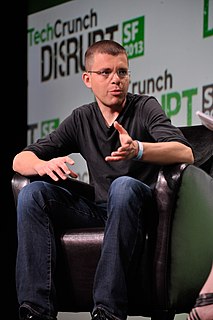A Quote by Max Levchin
Facebook is so ubiquitous now that it's like another manifestation of the web itself.
Quote Topics
Related Quotes
The largest issue with search is that we learned about it when the web was young, when the universe was 'complete' - the entire web was searchable! Now our digital lives are utterly fractured - in apps, in walled gardens like Facebook, across clunky interfaces like those in automobiles or Comcast cable boxes.
We started off as this platform inside Facebook; and we were pretty clear from the beginning that that wasn't where it was going to end up. A lot of people saw it and asked, 'Why is Facebook trying to get all these applications inside Facebook when the web is clearly the platform?' And we actually agreed with that.
Something really big happened in the world's wiring in the last decade, but it was obscured by the financial crisis and post-9/11. We went from a connected world to a hyperconnected world. I'm always struck that Facebook, Twitter, 4G, iPhones, iPads, high-speech broadband, ubiquitous wireless and Web-enabled cellphones, the cloud, Big Data, cellphone apps and Skype did not exist or were in their infancy a decade ago.
Yes, racism looks like hate, but hate is just one manifestation. Privilege is another. Access is another. Ignorance is another. Apathy is another, and so on. So while I agree with people who say no one is born racist, it remains a powerful system that we're immediately born into. It's like being born into air: you take it in as soon as you breathe.
What defines Web 2.0 is the fact that the material on it is generated by the users (consumers) rather than the producers of the system. Thus, those who operate on Web 2.0 can be called prosumers because they simultaneously produce what they consume such as the interaction on Facebook and the entries on Wikipedia.
































